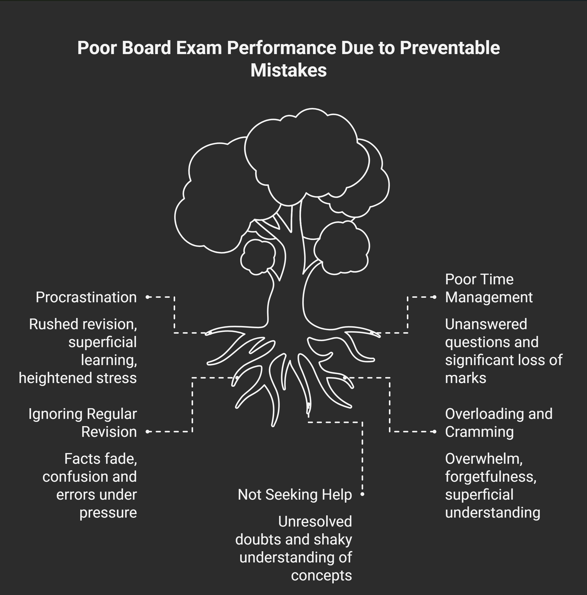5 Critical Mistakes That Will Cost You Dearly in Your Board Exams: How to Avoid Them
- Rahul Subuddhi
- Sep 24
- 3 min read

5 Mistakes That Will Cost You Dearly in Your Board Exams
Introduction
Board exams can make or break academic futures, and while studying hard is essential, avoiding common mistakes is just as crucial. Many students prepare well but lose crucial marks due to preventable errors. This guide highlights the 5 biggest mistakes that can cost dearly and how to overcome them for exam day success.
Mistake 1: Procrastination — Starting Late
What Happens:Delaying study starts leads to rushed revision, superficial learning, and unwanted stress. This "later, later" trap often results in cramming at the last minute, which is ineffective and exhausting.
How to Fix:Start early and create a structured study plan. Break the syllabus into manageable chunks and set daily goals. Consistent effort beats frantic last-minute preparation.
Mistake 2: Poor Time Management During Exams
What Happens:Spending too much time on one question reduces time for others, causing unanswered questions. Not using the reading time well leads to improper question selection and careless mistakes.
How to Fix:Use the initial reading time to plan question order. Allocate time proportionally based on marks and difficulty. Practice time management with mock papers and past exams.
Mistake 3: Ignoring Regular Revision
What Happens:Without regular revision, facts and formulas fade, leading to confusion and errors under pressure. Many students skip thorough review and miss important concepts.
How to Fix:Schedule frequent revision sessions alongside new learning. Use flashcards, summaries, and practice tests to reinforce memory. Reviewing consistently helps recall during exams.
Mistake 4: Overloading and Cramming
What Happens:Trying to memorize large volumes of information shortly before exams leads to overwhelm and forgetfulness. Cramming does not build deep understanding.
How to Fix:Study strategically by understanding concepts and practicing application. Space out learning and rely on active recall to strengthen retention over time.
Mistake 5: Not Seeking Help When Stuck
What Happens:Students often hesitate to ask teachers or peers when facing difficulties, leading to unresolved doubts and shaky understanding.
How to Fix:Reach out early for clarification through teachers, friends, or online resources. Resolving doubts promptly solidifies your grasp on tough topics and boosts confidence.
Conclusion
Success in board exams depends not only on knowledge but also on exam preparation strategy and mental readiness. By avoiding procrastination, managing time wisely, revising regularly, studying smartly, and seeking help, students can maximize their performance and walk confidently into exam halls. Q: How early should I start preparing to avoid procrastination?
A: Ideally, start right after your syllabus is announced. Create a study timetable breaking the syllabus into daily or weekly targets to avoid last-minute cramming.
Q: What’s the best way to manage my time during the exam?
A: Use the reading time to plan which questions to answer first, allocating more time to high-mark and tougher questions. Practice timed mock exams regularly.
Q: How often should I revise to keep concepts fresh?
A: Incorporate brief revision sessions daily or at least twice a week. Use tools like flashcards and quick tests to reinforce memory consistently.
Q: Why is cramming so ineffective compared to spaced learning?
A: Cramming overloads your memory and causes rapid forgetting, while spaced learning strengthens understanding and memory retention through repeated exposure over time.
Q: I feel shy to ask questions in class. How can I overcome this?
A: Remember, asking questions helps you learn better. Try speaking to teachers after class or discussing doubts with classmates or online study groups.
Q: How can I avoid spending too much time on one tough question?
A: Set a maximum time limit for each question during practice and move on if stuck. Come back later if time permits.
Q: Is it okay to skip revising topics I’m confident about?
A: It’s better to revise all topics periodically, including strong areas, to maintain confidence and avoid surprises during exams.
Q: Can using summaries and flashcards really improve my revision?
A: Yes, they condense information and promote active recall, making revision quicker and more effective.
Q: What’s a good method to break down the syllabus into manageable parts?
A: Divide the syllabus by chapters or units, set achievable daily goals, and balance subjects throughout the week to maintain steady progress.
Q: How can I stay motivated when the preparation feels overwhelming?
A: Take short breaks, reward yourself for completing goals, visualize your success, and remind yourself of the benefits of good preparation.
#BoardExams #ExamMistakes #StudyTips #TimeManagement #ExamPreparation #StudentSuccess #ExamStrategy #AvoidMistakes #AcademicTips #BoardExam2025 #StudentLife #ExamStress #StudyMotivation #ExamReady



_edited.jpg)


































monero miners monero miners
monero miners monero miners
monero miners monero miners
monero miners monero miners
monero miners monero miners
monero miners monero miners
etc mining etc mining
monero miners monero miners
monero miners monero miners
monero miners monero miners
monero miners monero miners
monero miners monero miners
monero miners monero miners
etc mining etc mining
monero miners monero miners
monero miners monero miners
monero miners monero miners
monero miners monero miners
monero miners monero miners
monero miners monero miners
etc mining etc mining
monero miners monero miners
monero miners monero miners
monero miners monero miners
monero miners monero miners
monero miners monero miners
monero miners monero miners
etc mining etc mining
monero miners monero miners
monero miners monero miners
monero miners monero miners
monero miners monero miners
monero miners monero miners
monero miners monero miners
etc mining etc mining